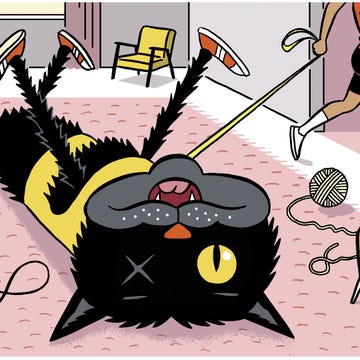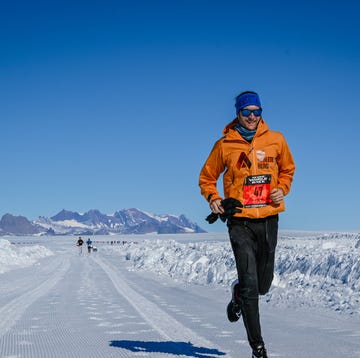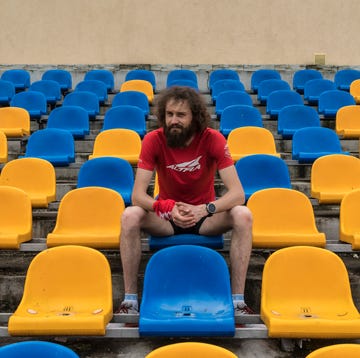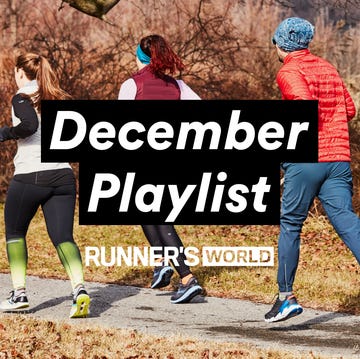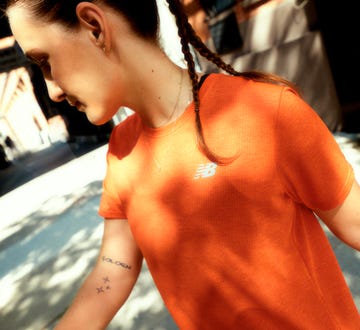I bounced nervously on the track, eyeing my 30 or so competitors, picking out the few who were older, the fewer who were shorter, the tiny number who were fatter, seeing which ones I might be able to beat. Well, sure, I was among the slowest and oldest of the runners on the track, but I had other skills–skills honed at decades of dinner parties and barbecues–that might allow me to storm right into the homes of these young kids and eat their lunch. Or drink it.
Then, a Chicago police car slowly cruised by, and 30 runners simultaneously slipped their beer cans under their shirts and tried to look innocent.
As is appropriate for something drenched in alcohol, nobody can remember the origins of the Beer Mile. According to Beermile.com, the first such run was held somewhere back in the '80s, or maybe it was the '90s, or maybe it sprouted up in multiple places simultaneously in one of those mass bursts of creativity, as runners all over the English-speaking world said to themselves, We like to run, we like beer, why not combine them? Whatever its origins, the event has spread as rapidly as a spilled beer: The Web site now has stats from 1,400 races around the globe and notes that only about one in eight beer-mile organizers think, or remember, to send in their results.
The patrol car went on its way. Heidi, the 29-year-old Chicago investment banker who had organized the race, shouted the rules through a battery-powered megaphone: "You have to finish one can of beer before you start, and one more can of beer before each of the next three laps! Show the completely empty can to one of the volunteers before you start the lap! If you vomit, you're disqualified!"
I honestly thought I had the thing won. I might be old and slow, but I had been drinking beer before some of these kids were born. And God didn't give me those love handles for looks, people...those are beer storage pods! "Go!" shouted the starter, and the sound of 30 cans of Pabst Blue Ribbon being cracked simultaneously echoed off the trees.
The beer was much warmer than the chilly spring air–and highly carbonated–so trying to chug it was less like taking a refreshing drink than sucking on a wet air hose. I threw away my empty and started off down the track, in the middle of the pack, feeling like a beer-bubble balloon trying not to spring a leak. My sprint quickly devolved to a stumble. I finished the lap in a slow two minutes, but many of the runners who had passed me were having trouble with Beer Number 2, so all I had to do was chug it, and I'd be ahead of them again.
Right. Yes. That chugging. The second beer seemed even warmer than the first, and even more carbonated, and as I finished its last dregs, I hallucinated carbon dioxide exploding from my mouth, nose, ears, and even pupils. I had gone from balloon to Hindenburg. I had expected to get drunk. I had expected to get giddy. I had not expected to be miserable.
I made it halfway around the track, and the beer I was carrying in my tummy decided it would be much happier behind a tree 10 yards off the track. I then jogged back around to the start, and said that I was disqualified. "You don't have to tell anybody," whispered my friend Chillag. "Oh, no," I replied. "I AM DISQUALIFIED!"
And so I watched the other runners compete with the intensity and determination usually seen in much more sober athletes. The race was won (somewhat to my shame) by a 46-year-old man in an amazing 7:41–"He's a great runner, and a great drinker," said Heidi, unnecessarily–and second place overall was taken by a woman, a competitive collegiate cross-country runner who looked tough enough to triumph over any beverage. Two young men threw their last empties into the bin together and engaged in an intense duel for third that would have been thrilling even if both participants, and many of the spectators, weren't stoned on PBR.
After the entire crew celebrated and escorted in the last finisher–a woman who gamely staggered across the line in 28:10–the designated drivers in attendance organized rides for the participants to the bar for the postrun celebration, where more beer could be enjoyed at a more moderate pace. The arguments about who ran best, who ran worst, and who was going to win next time, started before the cars did.
We runners talk about having fun, but I don't think anybody believes us. We talk about discipline and endurance, we take care, we exercise caution, we watch our diets and monitor our pace. We are ascetics who talk, unconvincingly, of the bracing enjoyment of self-abuse. So, even as the excess carbonation leaked out of my various orifices, even as the world slowly stopped spinning around me, I enjoyed something that I normally don't hear around groups of runners: gales of laughter. Beer may not help your running; but lightening up, as I did on one clandestine night in Chicago, certainly will.


